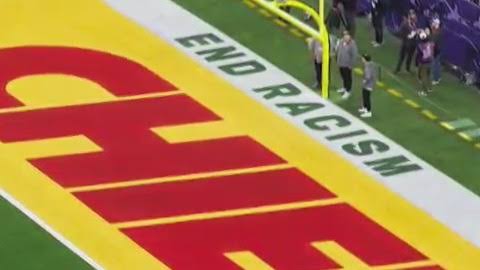
The NFL’s decision to remove the “END RACISM” messaging from its fields has reignited serious controversy, leading to heightened tensions across the country. The move has sparked backlash, with many viewing it as a step backward in the fight against racial inequality. Additionally, reports indicate that certain white groups have responded with alarming threats, further intensifying concerns over safety and social divisions.
While the league has not officially provided a detailed explanation for the removal, critics argue that it sends a troubling message, especially given the ongoing racial justice struggles in the United States. Many activists and community leaders believe the NFL’s previous commitment to racial justice initiatives played a significant role in fostering awareness and dialogue. The decision to eliminate such messaging has therefore been perceived as a retreat from those commitments, potentially undermining the progress made in recent years.
Supporters of the NFL’s move, however, argue that the league is aiming to shift its focus back to football, avoiding political or social messaging that could alienate certain fan bases. Some believe that the organization is responding to pressure from conservative groups who have long criticized the inclusion of social justice slogans in professional sports. These individuals claim that politics should not be mixed with entertainment, and they view the removal as a necessary step in maintaining the game’s neutrality.
Despite these justifications, the reaction from racial justice advocates has been swift and intense. Many argue that removing the “END RACISM” slogan ignores the systemic issues that still persist within the league and the broader society. Players, coaches, and even some team owners have expressed concerns that the NFL’s decision could be interpreted as indifference toward racial equality efforts. Some have even called for protests, boycotts, and further action to hold the league accountable.
Moreover, the situation has been exacerbated by disturbing threats reportedly made by white extremist groups. These threats have raised fears of potential violence and unrest, creating a climate of fear and uncertainty. Law enforcement agencies are reportedly monitoring the situation closely, ensuring that any threats are taken seriously and addressed accordingly.
The controversy has also led to renewed discussions about the NFL’s history regarding racial issues. Critics point to past instances where the league has been accused of failing to support Black players and social justice movements. From the Colin Kaepernick protests to past discrimination lawsuits, the NFL has long faced scrutiny over its handling of race-related matters. The removal of the “END RACISM” message has only added fuel to these concerns, with many questioning the league’s true stance on equality.
As the backlash grows, it remains to be seen whether the NFL will respond to public pressure and reconsider its decision. Some organizations and civil rights groups are already calling for meetings with league officials to discuss the implications of this move and demand further action to support racial justice initiatives.
Ultimately, the NFL’s choice to remove the slogan has become more than just a policy change—it has become a symbol of the ongoing struggle over race and equality in America. The league now finds itself at the center of a national debate, facing the challenge of balancing its public image, fanbase, and moral responsibilities. Whether this decision will have long-term repercussions for the NFL’s reputation and influence remains uncertain, but for now, the controversy continues to unfold with significant consequences.